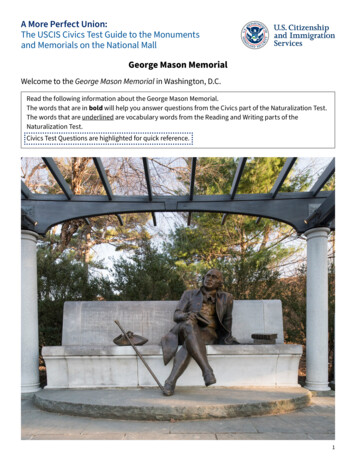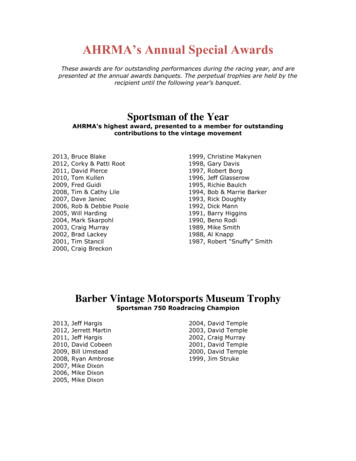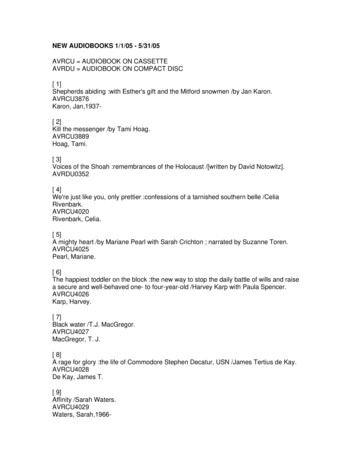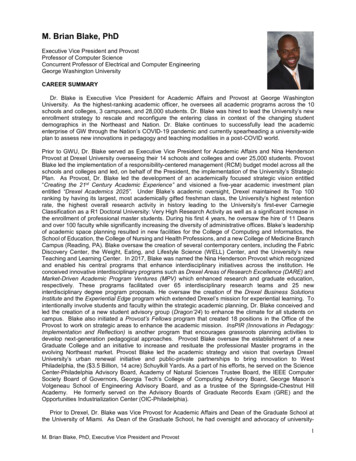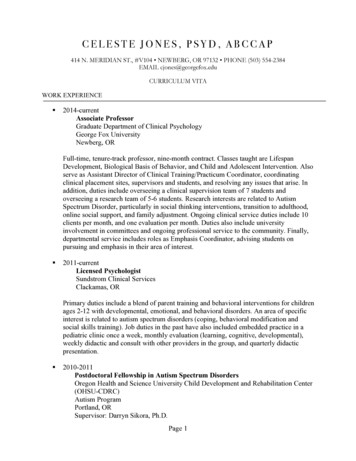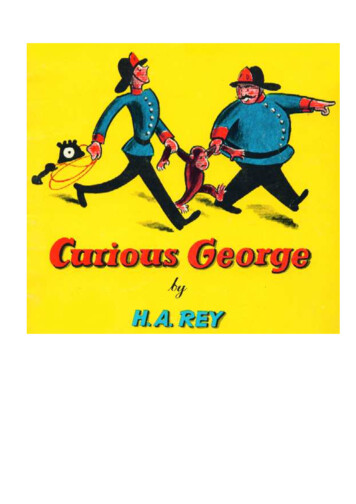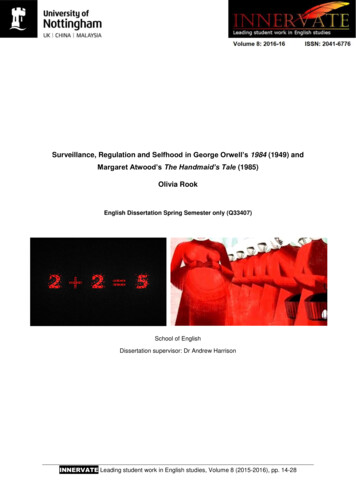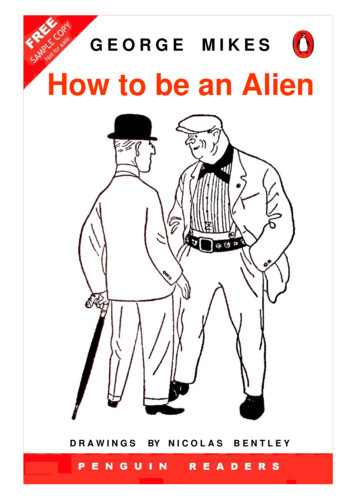
Transcription
GEORGEMIKESHow to be an AlienDRAWINGSBY N I C O L A SBENTLEY
How to be an AlienGEORGE MIKESNicolas Bentleydrew the picturesLevel 3Retold by Karen HolmesSeries Editors: Andy Hopkins and Jocelyn Potter
Pearson Education limitedEdinburgh Gate, Harlow,Essex CM20 2JE, Englandand Associated Companies throughout the world.ISBN 0 582 468272First published by Andre Deutsch 1946Copyright 1946 by George Mikes and Nicolas BentleyThis adaptation first published by Penguin Books 1998Published by Addison Wesley Longman Limited and Penguin Books Ltd. 1998This edition first published 2000Text copyright Karen Holmes 1998All illustrations copyright Nicolas Bentley 1946All rights reservedThe moral right of the adapter and of the illustrator has been assertedTypeset by Digital Type, LondonSet in ll/14pt BemboPrinted in Spain by Mateu Cromo, S. A. Pinto (Madrid)All rights reserved; no part of this publication may be reproduced, storedin a retrieval system, or transmitted in any form or by any means,electronic, mechanical, photocopying, recording or otherwise, without theprior written permission of the Publishers.Published by Pearson Education Limited in association with Penguin Books Ltd, bothcompanies being subsidiaries of Pearson PlcFor a complete list of the tides available in the Penguin Readers series please write to yourlocal Pearson Education office or to: Marketing Department, Penguin Longman Publishing,5 Bentinck Street, London W1M 5RN.
ContentspageIntroductionivPreface1Part 1 The Most Important Rules3Chapter 1Chapter 2Chapter 3Chapter 4Chapter 5Chapter 6Chapter 7Chapter 8Chapter 9Chapter 10Chapter 11Chapter 12Chapter 13Chapter 14Chapter 15A Warning to BeginnersIntroducing PeopleThe WeatherExamples for ConversationSoul: Not Quite Saying What You MeanTeaSexThe LanguageHow Not to Be CleverHow to Be RudeHow to CompromiseHow to Be a HypocriteSmall PleasuresFavourite ThingsRemember35771011121214151718181921Part 2 Less Important Rules and someSpecial Examples21Chapter 16Chapter 17Chapter 18Chapter 19Chapter 20Chapter 21Chapter 22Chapter 23Chapter 24212223242829323537ActivitiesA Bloomsbury IntellectualMayfair PlayboyHow to Be a Film-MakerDriving CarsThree Games for Bus DriversHow to Plan a TownCivil ServantsBritish NewspapersIf Naturalized41
IntroductionThe weather is the most important subject in the land. In Europe,people say, ‘He is the type of person who talks about theweather,’ to show that somebody is very boring. In England, theweather is always an interesting, exciting subject and you must begood at talking about it.George Mikes wrote this book to tell the English what he thoughtabout them. He is both funny and rude about the strange thingsEnglish people do and say - the things that make them differentfrom other Europeans. In this book you will learn many usefulrules about being English. You will learn how to talk about theweather, and what to say when somebody brings you a cup of teaat 5 o’clock in the morning. You will discover what the Englishreally think of clever people and doctors. This book will help youto be more like the English. As George Mikes says: ‘If you arelike the English, they think you are funny. If you are not likethem, they think you are even funnier.’George Mikes was born in Hungary in 1921. He studied law atBudapest University, and then began to write for newspapers. Hecame to London for two weeks just before the Second World Warbegan, and made England his home for the rest of his life. Duringthe war he worked for the BBC, making radio programmes forHungary.He wrote How to be an Alien in 1946. He did not want to writean amusing book, but thousands of English people bought it andfound it very funny. He wrote many other books about foreignersand English people. The story of his life, How to be Seventy, wenton sale in bookshops on his seventieth birthday in 1982. He diedin 1987.iv
PREFACEI wrote this book in 1946. Many people bought it and said kindthings about it. I was surprised and pleased but I was alsounhappy that they liked it.I will explain.It is very nice when a lot of people buy a book by a newwriter. I’m sorry, ‘very nice’ is not an English thing to say. It isnot unpleasant when a lot of readers like a new book.Why was I unhappy? I wrote this book to tell the Englishwhat I thought about them, or ‘where to get off as they say. Ithought I was brave. I thought, ‘This book is going to make theEnglish angry!’ But no storm came! The English only said thatmy book was ‘quite amusing’. I was very unhappy.Then, a few weeks later, I heard about a woman who gave thisbook to her husband because she thought it was ‘quite amusing’.The man sat down, put his feet up, and read the book. His facebecame darker and darker. When he finished the book, he stoodup and said, ‘Rude! Very, very rude!’ He threw the book into thefire.What a good Englishman! He said just the right thing, and I feltmuch better. I hoped to meet more men like him, but I neverfound another Englishman who did not like the book.I have written many more books since then but nobodyremembers them. Everybody thinks How to be an Alien is theonly book that I have ever written. This is a problem. I am now inthe middle of writing a very large and serious book, 750 pageslong. about old Sumeria. I will win the Nobel Prize for it. It willmake no difference; people will still think How to be an Alien isthe only book that I have ever written.People ask me, ‘When are you going to write another How to bean Alien?’ I am sure they mean to be kind, but they cannot quiteunderstand my quiet reply: ‘Never, I hope.’1
I think I am the right person to write about ‘how to be an alien’.I am an alien. I have been an alien all my life. I first understoodthat I was an alien when I was twenty-six years old. In mycountry, Hungary, everybody was an alien so I did not think I wasvery different or unusual. Then I came to England and learnedthat I was different. This was an unpleasant surprise.I learned immediately that I was an alien. People learn allimportant things in a few seconds. A long time ago I spent a lot oftime with a young woman who was very proud of being English.One day, to my great surprise, she asked me to marry her.‘No,’ I replied, ‘I cannot marry you. My mother does not wantme to marry a foreigner.’She looked surprised and replied, ‘Me, a foreigner? What afunny thing to say. I’m English. You are the foreigner! And yourmother is a foreigner, too!’I did not agree. ‘Am I a foreigner in Budapest, too?’ I asked.‘Everywhere,’ she said. ‘If it’s true that you’re an alien inEngland, it’s also true in Hungary and North Borneo andVenezuela and everywhere.’She was right, of course, and I was quite unhappy about it.There is no way out of it. Other people can change. A criminalcan perhaps change his ways and become a better person but aforeigner cannot change. A foreigner is always a foreigner. Hecan become British, perhaps; he can never become truly English.So it is better to understand that you are always a foreigner.Maybe some English people will forgive you. They will be politeto you. They will ask you into their homes and they will be kindto you. The English keep dogs and cats and they are happy tokeep a few foreigners, too. This book offers you some rules aboutbeing an alien in England. Study them carefully. They will helpyou to be more like the English. If you are like the English, theythink you are funny. If you are not like them, they think you areeven funnier.G.M.2
PART 1THE MOST IMPORTANT RULESChapter 1 A Warning to BeginnersIn England everything is different. You must understand thatwhen people say ‘England’, they sometimes mean ‘Great Britain’(England, Scotland and Wales), sometimes ‘the United Kingdom’(England Scotland, Wales and Northern Ireland), sometimes the‘British Isles’ (England, Scotland, Wales, Northern Ireland andthe Republic of Ireland) – but never just England.On Sundays in Europe, the poorest person wears his bestclothes and the life of the country becomes happy, bright andcolourful; on Sundays in England, the richest people wear theiroldest clothes and the country becomes dark and sad. In Europenobody talks about the weather; in England, you have to say‘Nice day, isn’t it?’ about two hundred times every day, or peoplethink you are a bit boring. In Europe you get Sunday newspaperson Monday. In England, a strange country, you get Sundaynewspapers on Sunday.On a European bus the driver uses the bell if he wants to driveon past a bus-stop without stopping. In England you use the bellwhen you want the bus to stop. In Europe people like their catsbut in England they love their cats more than their family. InEurope, people eat good food. In England people think that goodmanners at the table are more important than the food you get toeat. The English eat bad food but they say it tastes good.In Europe important people speak loudly and clearly; inEngland they learn to speak slowly and quietly so you cannotunderstand them. In Europe, clever people show that they areclever by talking about Aristotle, Horace and Montaigne; inEngland only stupid people try to show how clever they are. The3
On Sundays in England, the richest people wear their oldest clothesand the country becomes sad and dark.
only people who talk about Latin and Greek writers are thosewho have not read them.In Europe, almost every country, big or small, fights wars toshow they are the best; the English fight wars against those peoplewho think they are the best. The English already know whichcountry is really the best. Europeans cry and quickly get angry;instead of this the English just laugh quietly at their problems. InEurope people are either honest with you or they lie to you; inEngland people almost never lie, but they are almost never quitehonest with you either. Many Europeans think that life is a game;the English think cricket is a game.Chapter 2 Introducing PeopleThis part of the book tells you how to introduce people to otherpeople.Most importantly, when you introduce strangers, do not saytheir name so that the other person is able to hear it. Usually thisis not a problem because nobody can understand your accent.If somebody introduces you to a stranger, there are twoimportant rules to follow.1 If he puts out his hand to shake yours, do not take it. Smile andwait. When he stops trying to shake your hand, try to shake his.Repeat this game all afternoon or evening. Quite possibly this willbe the most amusing part of your afternoon or evening.2 The introductions are finished and your new friend asks if youare well: ‘How do you do? ‘ But do not forget: he does not reallywant to know. To him it does not matter if you are well or if youare dying of a terrible illness. Do not answer. Your conversationwill be like this:HE: ‘How do you do?’5
If he puts out his hand to shake yours, do not take it. When he stopstrying to shake your hand, try to shake his.
YOU: ‘Quite good health. Not sleeping very well. Left foot hurtsa bit. One or two stomach problems.’A conversation like this is un-English, and unforgivable. Whenyou meet somebody, never say, ‘Pleased to meet you.’ Englishpeople think this is very rude.And one other thing: do not call foreign lawyers, teachers,doctors, dentists or shopkeepers ‘Doctor’. Everybody knows thatthe little word ‘doctor’ means that you are a central European. Itis not a good thing to be a central European in England, so you donot want people to remember.Chapter 3 The WeatherThis is the most important subject m the land. In Europe, peoplesay, ‘He is the type of person who talks about the weather,’ toshow that somebody is very boring. In England, the weather isalways an interesting, exciting subject and you must be good attalking about it.Chapter 4Examples for ConversationFor Good Weather‘Nice day, isn’t it? ‘‘Isn’t it beautiful?’‘The sun‘Isn’t it wonderful?’‘Yes, wonderful, isn’t it? ‘‘It’s so nice and hot . . .’‘I think it’s so nice when it’s hot, isn’t it?’‘I really love it, don’t you? ‘7
For Bad Weather‘Terrible day, isn’t it?’‘Isn’t it unpleasant?’‘The rain . I don’t like the rain.’‘Just think - a day like this in July. It rains in the morning, then abit of sun and then rain, rain, rain, all day’‘I remember the same July day in 1936‘Yes, I remember too.’‘Or was it 1928?’‘Yes, it was.’‘Or in 1939?’‘Yes, that’s right.’Now look at the last few sentences of this conversation. You cansee a very important rule: you must always agree with otherpeople when you talk about the weather. If it is raining andsnowing and the wind is knocking down trees, and someone says,‘Nice day, isn’t it?’ answer immediately, ‘Isn’t it wonderful?’Learn these conversations by heart. You can use them again andagain. If you repeat these conversations every day for the rest ofyour life, it is possible that people will think you are clever, politeand amusing.Listen to the weather reports on the radio and you will heardifferent weather reports for different people. There is always adifferent report for farmers. For example, you hear, ‘Tomorrow itwill be cloudy and cold. There will be a lot of rain.’Then, immediately after this you hear, ‘Weather report forfarmers. It will be bright and warm and there will be a lot ofsunshine.’Farmers do important work for the country, so they need betterweather, you see.Often the radio tells you that it is a nice day but then you look8
If it is raining and someone says, 'Nice, day, isn't it?'answer immediately, 'Isn't it wonderful?'outside and see that it is raining or snowing. Sometimes the radiosays it is a rainy day and you see that the sun is shining brightly.This is not because the weather people have made a mistake. It isbecause they have reported the right weather as they want it to bebut then some troublesome weather from another part of theworld moves in across Britain and changes the weather picture. IfBritish weather has to mix with foreign weather, things are notlooking very good.9
Chapter 5 Soul: Not Quite Saying What You MeanForeigners have souls; the English do not have souls. In Europeyou find many people who look sad. This is soul. The worst kindof soul belongs to the Slav people. Slavs are usually very deepthinkers. They say things like this: ‘Sometimes I am so happy andsometimes I am so sad. Can you explain why?’ (You cannotexplain, do not try.) Or perhaps they say, ‘I want to be in someother place, not here.’ (Do not say, ‘I’d like you to be in someother place, too.’)All this is very deep. It is soul, just soul. But the English haveno soul. Instead they say less than they mean. For example, if aEuropean boy wants to tell a girl that he loves her, he goes downon his knees and tells her she is the sweetest, most beautiful andwonderful person in the world. She has something in her,something special, and he cannot live one more minutewithout her.In Europe you find many people who look sad. This is soul.10
Sometimes, to make all this quite clear, he shoots himself. Thishappens every day in European countries where people have soul.In England the boy puts his hand on the girl’s shoulder and saysquietly, ‘You’re all right, you know.’If he really loves her, he says, ‘I really quite like you, in fact.’If he wants to marry a girl, he says, ‘I say . would you .?’If he wants to sleep with her, ‘I say . shall we.?’Chapter 6 TeaTea was once a good drink; with lemon and sugar it tastes verypleasant. But then the British decided to put cold milk and nosugar into it. They made it colourless and tasteless. In the handsof the English, tea became an unpleasant drink, like dirty water,but they still call it ‘tea’.Tea is the most important drink in Great Britain and Ireland.You must never say, ‘I do not want a cup of tea,’ or people willthink that you are very strange and very foreign.In an English home, you get a cup of tea at five o’clock in themorning when you are still trying to sleep. If your friend bringsyou a cup of tea and you wake from your sweetest morning sleep,you must not say, T think you are most unkind to wake me up andI’d like to shoot you!’ You must smile your best five o’clocksmile and say, ‘Thank you so much. I do love a cup of tea at thistime of the morning. ‘When your friend leaves the room, you canthrow the tea down the toilet.Then you have tea for breakfast; you have tea at eleven o’clockin the morning; then after lunch; then you have tea at ‘tea-time’(about four o’clock in the afternoon); then after supper; and againat eleven o’clock at night.You must drink more cups of tea if the weather is hot; if it iscold; if you are tired; if anybody thinks you are tired; if you are11
afraid; before you go out; if you are out; if you have just returnedhome; if you want a cup; if you do not want a cup; if you have nothad a cup for some time; if you have just had a cup.You must not follow my example. I sleep at five o’clock in themorning; I have coffee for breakfast; I drink black coffee againand again during the day; I drink strange and unusual teas (withno milk) at tea-time.I have these funny foreign ways . and my poor wife (who wasonce a good Englishwoman) now has them too, I’m sorry to say.Chapter 7 SexEuropean men and women have sex lives; English men andwomen have hot-water bottles.Chapter 8 The LanguageWhen I arrived in England I thought that I knew English. AfterI’d been here an hour I realized I did not understand one word. Inmy first week I learned a little of the language, but after sevenyears I knew that I could never use it really well. This is sad, butnobody speaks English perfectly.Remember that those five hundred words the ordinaryEnglishman uses-most are not all the words in the language. Youcan learn another five hundred and another five thousand andanother fifty thousand words after that and you will still findanother fifty thousand you have never heard of. Nobody has heardof them.If you live in England for a long time you will be very surprisedto find that the word nice is not the only adjective in the Englishlanguage. For the first three years you do not need to12
learn or use any other adjectives. You can say that the weather isnice, a restaurant is nice, Mr So-and-so is nice, Mrs So-and-so’sclothes are nice, you had a nice time, and all this will be verynice.You must decide about your accent. You will have your foreignaccent all right but many people like to mix it with another accent.I knew a Polish Jew who had a strong Yiddish-Irish accent.People thought he was very interesting.The easiest way to show that you have a good accent (or noforeign accent) is to hold a pipe or cigar in your mouth, to speakthrough your teeth and finish all your sentences with the question:‘isn’t it?’ People will not understand you, but they will think thatyou probably speak very good English.Hold a pipe in your mouth, speak through your teeth and finish allyour sentences with the question: 'isn't it?'13
Many foreigners try hard to speak with an Oxford accent. Thecity of Oxford has a famous university. If you have an Oxfordaccent, people think that you mix with clever people and that youare very intelligent. But the Oxford accent hurts your throat and ishard to use all the time.Sometimes you can forget to use it, speak with your foreignaccent and then where are you? People will laugh at you. The bestway to look clever is to use long words, of course. These wordsare often old Latin and Greek words, which the English languagehas taken in. Many foreigners have learned Latin and Greek inschool and they find that (a) it is much easier to learn these wordsthan the much shorter English words; (b) these words are usuallyvery long and make you seem very intelligent when you talk toshopkeepers and postmen. But be careful with all these longwords — they do not always have the same meaning as they oncehad in Latin or Greek. When you know all the long words,remember to learn some short ones, too.Finally there are two important things to remember:1 Do not forget that it is much easier to write in English than tospeak English, because you can write without a foreign accent.2 On a bus or in the street it is better to speak quietly in goodGerman than to shout loudly in bad English. Anyway, all thislanguage business is not easy. After eight years in this country, avery kind woman told me the other day, ‘You speak with a verygood accent, but without any English.’Chapter 9 How Not to Be Clever‘You foreigners are so clever,’ a woman said to me some yearsago. I know many foreigners who are stupid. I thought she wasbeing kind but not quite honest.14
Now I know that she was not being kind. These words showedthat she did not like foreigners. Look at the word ‘clever’ in anyEnglish dictionary. These dictionaries say ‘clever’ means, ‘quick,intelligent’. These are nice adjectives but the dictionaries are all alittle out of date. A modern Englishman uses the word ‘clever’ tomean ‘possibly a bit dishonest, un-English, un-Scottish,un-Welsh’.In England it is bad manners to be clever or proud of yourintelligence. Perhaps you know that two and two make four, butyou must never say that two and two make four.The Englishman is shy and quiet. He does not show that he isclever. He uses few words but he says a lot with them. AEuropean, for example, looks at a beautiful place and says, ‘Thisplace looks like Utrecht, where a war ended on the 11 th April,1713. The river over there is like the Guadalquivir in the Sierra deCazorla and is 650 kilometres long. It runs south-west to theAtlantic Ocean. Rivers . . what does So-and-so say? . . did I tellyou about . . .?’You cannot speak like this in England. An Englishman looks atthe same place. He is silent for two or three hours and then hesays, ‘It’s pretty, isn’t it?’An English girl, of course. understands it is not clever to knowif Budapest is the capital city of Romania, Hungary or Bulgaria. Itis so much nicer to ask, when someone speaks of Barbados,Banska Bystrica or Fiji, ‘Oh, those little islands . . . are theyBritish?1 (Once, they usually were.)Chapter 10How to Be RudeIt is easy to be rude in Europe. You just shout and call peopleanimal names. To be very rude, you can make up terrible storiesabout them.In England people are rude in a very different way It somebodytells you an untrue story, in Europe you say, ‘You are a15
It is easy to be rude in Europe. You just shout and callpeople animal names.
liar, sir.’ In England you just say, ‘Oh, is that so?’ Or, ‘That’squite an unusual story, isn’t it ?’A few years ago, when I knew only about ten words of Englishand used them all wrong, I went for a job. The man who saw mesaid quietly, ‘I’m afraid your English is a bit unusual.’ In anyEuropean language, this means, ‘Kick this man out of the office!’A hundred years ago, if somebody made the Sultan of Turkeyor the Czar of Russia angry, they cut off the person’s headimmediately But when somebody made the English queen angry,she said, ‘We are not amused,’ and the English are still, to thisday, very proud of their queen for being so rude.Terribly rude things to say are: ‘I’m afraid that .’, ‘Howstrange that .’ and Tm sorry, but .’ You must look very seriouswhen you say these things.It is true that sometimes you hear people shout, ‘Get out ofhere!’ or ‘Shut your big mouth!’ or ‘Dirty pig!’ etc. This is veryun-English. Foreigners who lived in England hundreds of yearsago probably introduced these things to the English language.Chapter 11 How to CompromiseFor the British, compromise is very important. Compromisemeans that you bring together everything that is bad. Forexample, English people agree to go to a party but then do notspeak to anyone.In an English house you can see that the English compromise. Itis all right for their houses to have walls and a roof, but they mustbe as cold inside as the garden outside. It is all right to have a firein an English home, but if you sit in front of it, your face is hotbut your back is cold. It is a compromise; it answers the problemof how to burn and catch a cold at the same time.In an English pub, you can have a drink at five minutes after sixbut you cannot have a drink at five minutes before six. This is a17
compromise. To drink too much between three o’clock and sixo’clock in the afternoon, you must stay at home.The English language is a compromise between sensible, easywords and words which nobody understands.A visit to the cinema is a compromise: you must queueuncomfortably for three hours to get inside the cinema so that youcan be comfortable for one hour during the film.English weather is a compromise between rain and snow. Infact, almost everything about life in England is a compromise.Chapter 12How to Be a HypocriteIf you want to be really and truly British, you must become ahypocrite.Now; how do you become a hypocrite?As some people say an example explains things best, I’ll trythis way.I was having a drink with an English friend in a pub. We weresitting on high chairs near the bar when suddenly there was a fightand some shooting in the street. I was truly and honestlyfrightened. A few seconds later I looked for my friend but Icouldn’t see him anywhere. At last I saw that he was lying on thefloor. When he realized we were safe in the pub, he stood up. Heturned to me and smiled. ‘Good God!’ he said. ‘You werefrightened! You didn’t even move!’Chapter 13Small PleasuresIt is important to learn to enjoy small pleasures because that ifterribly English. All serious Englishmen play cricket and othergames. During the war, the French thought the English were18
childish because they played football and children’s games whenthey were not fighting.Boring and important foreigners cannot understand these smallpleasures. They ask: why do important men in the Britishgovernment stand up and sing children’s songs? Why do seriousbusinessmen play with children’s trains while their children sit inthe next room learning their lessons? Why, more than anythingelse, do grown-up people want to hit a little ball into a small hole?(This is a very popular sport in England.) Why are the great menin government who saved England in the war only called ‘quitegood men’? Foreigners want to know: why do English peoplesing when nobody is in the room? If somebody is in the room, theEnglish will stay silent for months.Chapter 14 Favourite ThingsIn England, people do not often get excited. They do not enjoymany things but they love to queue.In Europe, if people are waiting at a bus-stop they look boredand half asleep. When the bus arrives they fight to get on it. Mostof them leave on the bus and some are very lucky and leave in anambulance. One Englishman waits at a bus-stop and, even if thereare no other people there, he starts a queue.The biggest and best queues are in front of cinemas. Thesequeues have large cards that say: Queue here for 4s 6d; Queuehere for 9s 3d; Queue here for 16s 8d. Nobody goes to a cinema ifit does not have cards telling customers to queue.At weekends, an Englishman queues up at the bus-stop, travelsout to Richmond, queues up for a boat, then queues up for tea,then queues up for ice cream, then queues up some more becauseit is fun, then queues up at the bus-stop when he wants to gohome. He has a very good time.19
One Englishman waits at a bus-stop and, even if there are no otherpeople there, he starts a queue.
Many English families spend pleasant evenings at home just byqueuing for a few hours. The parents are very sad when thechildren leave them and queue up to go to bed.Chapter 15 RememberIf you go for a walk with a friend in England, don’t say a singleword for hours; if you go for a walk with your dog, talk to it allthe time.PART 2LESS IMPORTANT RULES AND SOMESPECIAL EXAMPLESChapter 16 A Bloomsbury Intellectual*Bloomsbury intellectuals do not “want to look like each other sothey all wear the same clothes: brown trousers, yellow shirt, greenand blue jacket. They also like purple shoes.They choose these clothes very carefully to show that they donot think clothes are important.It is terribly important that the B.I. always has a three-day beardbecause shaving is only for ordinary people. (Some B.I.s thinkwashing is only for ordinary people, too.) At first it is quitedifficult to shave a four-day beard so that it looks like a three-daybeard but, with practice, a B.I. can always have a perfect threeday beard.To be a Bloomsbury Intellectual you must be rude, because youhave to show day and night that the silly little rules of the countryare not meant for you. If you find it is too difficult to stop beingpolite, to stop saying ‘Hello’, and ‘How do you do?’* Bloomsbury is a part of Central London, near London University. Anintellectual is somebody who thinks he is very clever.21
and ‘Thank you’ etc., then go to a Bloomsbury school for badmanners. There you can learn to be rude. After two weeks, youwill not feel bad if, on purpose, you stand on the foot ofsomebody you do not like as you get on the bus.Finally, remember the most important rule. Always bedifferent! Only think and talk about new ideas. This is notdifficult; just think and talk about the same new ideas that otherBloomsbury Intellectuals think and talk about.Chapter 17 Mayfair Playboy*Put the little word de in front of your name. This makes peoplethink that you are important. I knew a man called Leo Rosenbergfrom Graz who called himself Lionel de Rosenberg and everyonethought he was an Austrian prince. Understand that the mostimportant thing in life is to have a nice time, go to nice places andmeet nice people. (Now: to have a nice time you must drink toomuch; nice places are great hotels and large houses with a lot ofmusic and no books; nice people say stupid things in good English– unpleasant people say clever things with a bad accent.) In theold days the man who had no money was not a gentleman. Today,in Mayfair, things are different. A gentleman can have money orborrow money from his friends; the important thing is that even if
book to her husband because she thought it was 'quite amusing'. The man sat down, put his feet up, and read the book. His face became darker and darker. When he finished the book, he stood up and said, 'Rude! Very, very rude!' He threw the book into the fire. What a good Englishman! He said just the right thing, and I felt much better.
